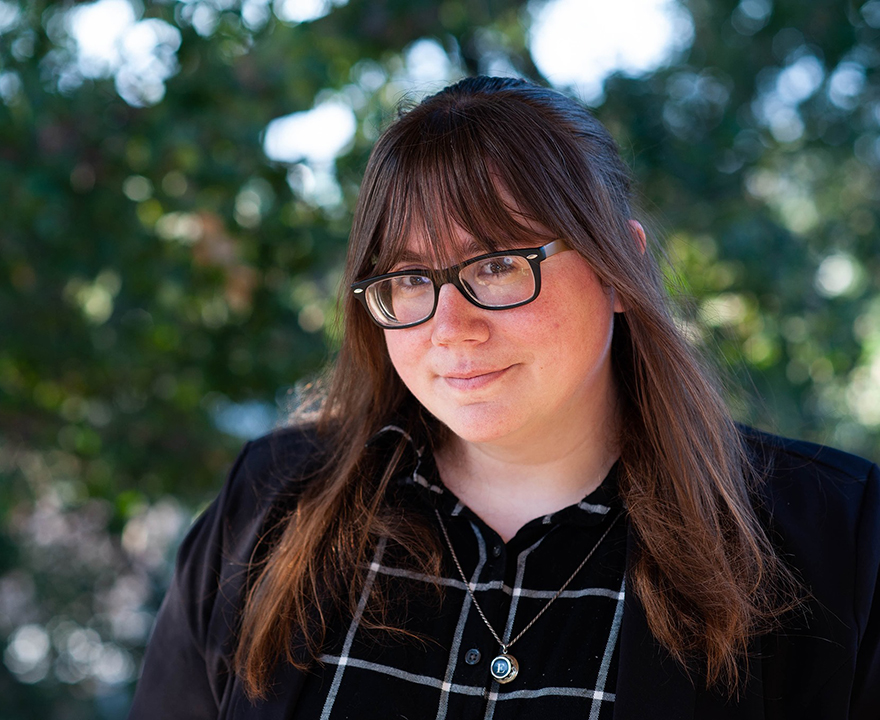Muehlmann earns UCI soc sci's Outstanding Service Award

Muehlmann earns UCI soc sci's Outstanding Service Award
- June 9, 2022
- Honor recognizes the poli sci grad student for exceptional contributions to the school community, including the intellectual growth of others
Name: Liz Muehlmann
Year, program: third-year political science graduate program
Hometown: San Dimas, California
Education: bachelor’s in philosophy, Polytechnic University – Pomona, master’s in communications,
California State University – Fullerton
Who have been your faculty mentors and what impact have they had on your success?
I have been very lucky to have great advisors throughout my education career. At every step of my education, I was unsure of myself and did not know if the ideas I had were worth pursuing. I owe all my success to the advisors I’ve had who saw something in me even when I couldn’t see it myself.
At Cal Poly Pomona, Ericka Tucker worked closely with me and encouraged me to pursue political philosophy. I am a first-generation college student and professor Tucker helped me make sense of academia. From starting a philosophy club at Cal Poly to applying to graduate school to now, she has been an unwavering cheerleader in my life.
At Cal State Fullerton, I wanted to study political communications and Emily Erickson took me on as a graduate student to make it happen. She encouraged me to pursue the type of research I was interested in, even though it was difficult. She lobbied on my behalf, and I owe my love of legal research to her.
Mary McThomas has been instrumental in my success here at UCI. Without Mary, I am not sure I would have survived the first few years of graduate school. Her unwavering support of my research has given me the confidence to pursue the type of work that I am interested in. She has encouraged me to find ways to merge my love for the media and unions and that has made a world of difference.
Ines Levin has also been amazing while here at UCI. As someone coming from a background in philosophy, Ines ignited a love for data that I did not know I had. She has encouraged me to increase my methodological skills. Although it has been difficult at times, I really appreciate the patience and care she shows to all students and to me especially.
What drew you to political science? What interests you most about the work you pursue, and what impact does it have for the general community?
During my undergraduate, I wrote on what kind of media was necessary for a deliberative democracy. In my master’s I shifted to look at the Supreme Court’s use of the First Amendment to undermine unions. In both I focused on how individuals can use information to pursue collective action to ensure the US maintains a legitimate and functioning democratic system.
I am primarily interested in how disparate individuals with wildly different wants and interests come together to form a government. Democracy relies on an informed citizenry and I want to know how do people get the information they need to participate in the democratic process.The media shapes the world we live in in ways I don’t think we fully understand. From the regulatory system of radio stations, the loss of local newspapers, to apps like NextDoor and Patch the world is increasingly mediated. Understanding how different types of media interact and how that interaction affects political participation is vital. The January 6th insurrection showed how dangerous information – or lack of it – can be for democracy.
What do you plan to do after finishing your graduate degree? How has UCI prepared you well for this role?
I want to do data analysis for social progress. At UCI I’ve increased my skills and confidence which has prepared me to pursue the kind of work I want to do. I have found amazing mentors and friends that are open to alt-ac careers.
The entire political science department at UCI has been instrumental in my success. I started the Ph.D. in 2019, just before the Coronavirus pandemic hit. I also suffered a great personal loss around the same time. The faculty in the department were very kind. When I thought I would have to withdraw to deal with the loss I experienced, the department worked with me to ensure I could continue. I will never forget the kindness and compassion they showed me.
Share on:




connect with us